Text
The Duality of Woman: Anais
Nin
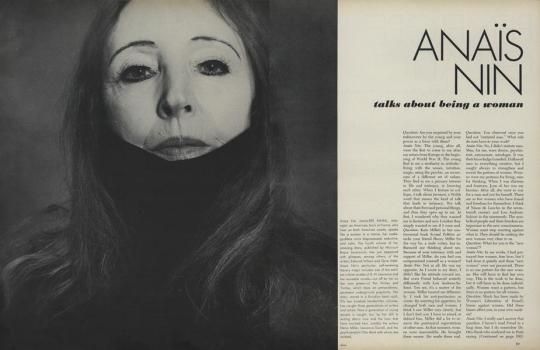
Vogue Magazine, Anais Nin talks about being a woman, 15 October 1971
Anais Nin is a woman of duality. It's been a well-known fact for those who know or love her that she is truly a two-sided coin. She said it herself in her book Henry and June,
"I will always be the virgin prostitute, the perverse angel, the two-faced sinister and saintly woman"(bookquoters.com).
From her intense marriages to two different men on opposite sides of the country, to her literary career, to even her personal reflections and essays, Nin was a figure bathed in duality. How does one split the image of Anais Nin ideally in half? You just have to find the seam between diarist and eroticist.
The Diarist
Anais Nin is most well-loved by her adoring fans because of her published diary. As a young girl, Nin wrote her father a letter begging him to return to the family he had abandoned (The Anais Nin Foundation). This was the beginning of Nin's diary, which would be published in seven volumes, with four unexpurgated diaries later appearing after their original publication.
Her diaries were incredibly personal, full of secrets and thoughts she never thought would come to light. The biggest secret within these diaries was that she was married to two different men simultaneously, something she would remove from the diaries upon initial publication. Years later, Nin compiled the removed sections into one volume, the first of her unexpurgated diaries. It was called Henry and June, and detailed the letters and writings the two shared. The duality of Nin stretched throughout every aspect of her life.
These highly intimate journals struck twentieth-century American women directly in their souls. As one journalist famously put it in an article for The Conversation,
Anaïs Nin dreamed, in all senses. She dreamed of lives and possibilities. She dreamed in slumber and allowed her dreams to leak into the day. As I regularly committed the cardinal social sin of recounting my dreams over breakfast, she seemed a soulmate across oceans and generations (Gorman).
These teenage girls and their daydreams were instantly hooked on Nin's likeminded wonder and splendid prose. She became a sensation after the diary publications almost instantly, giving her a decent seat in literary history.
It wouldn't be long until something else gave her another boost of fame.

Ramon Casas, Decadent Young Woman. After the Dance, 1899
The Eroticist
In the late 1970s, Anais Nine published three volumes of erotic short fiction, each containing approximately ten stories. Despite their popularity, the term erotic is a tad inappropriate. Although she wasn't a follower of the transgressive art movement like Georges Bataille, Anais Nin's erotic stories are more disturbing and controversial than actually arousing.
Nin wrote about such topics as sexual abuse, incest, pedophilia, and other forms of sexual violence within her stories. These works would go on to shock and challenge readers even today (Maza).

Lost Lenore Antiques, Anais Nin ~ Little Birds and Delta of Venus ~ 1st Edition Books ~ Vintage Erotica, 27 August 2021
Works Cited
The Anais Nin Foundation. “bio — The Anais Nin Foundation.” The Anais Nin Foundation, https://theanaisninfoundation.org/bio. Accessed 11 December 2023.
Gorman, Alice. “The book that changed me: journeying to the self with Anaïs Nin's sensual, transgressive diaries.” The Conversation, 25 April 2022, https://theconversation.com/the-book-that-changed-me-journeying-to-the-self-with-ana-s-nins-sensual-transgressive-diaries-176135. Accessed 11 December 2023.
Maza, Sarah, and Paul Herron. “Swinging: The Double Life of Anaïs Nin.” Public Books, 19 February 2018, https://www.publicbooks.org/swinging-the-double-life-of-anais-nin/. Accessed 11 December 2023.
Nin, Anaïs. “Quotes from Henry and June: From "A Journal of Love"--The Unexpurgated Diary of Anaïs Nin by Anaïs Nin.” BookQuoters, https://bookquoters.com/book/henry-and-june-from-a-journal-of-love-the-unexpurgated-diary-of-anais-nin. Accessed 11 December 2023.
Further Reading
#absurdism#french literature#academic aesthetic#academic writing#dark academia#academia#albert camus#academia aesthetic#english major#french#anais nin#delta of venus#diary#writeblogging#literature blog
42 notes
·
View notes
Text
Despite being an Italian text, it makes sense that a French artist would draw the illustrations that would accompany so many modern versions of the Divine Comedy. It is beautiful yet haunting, religious yet takes so many artistic liberties, and above all, it's mournful, hopeful, and simply romantic. Dore's illustrations are gorgeous.


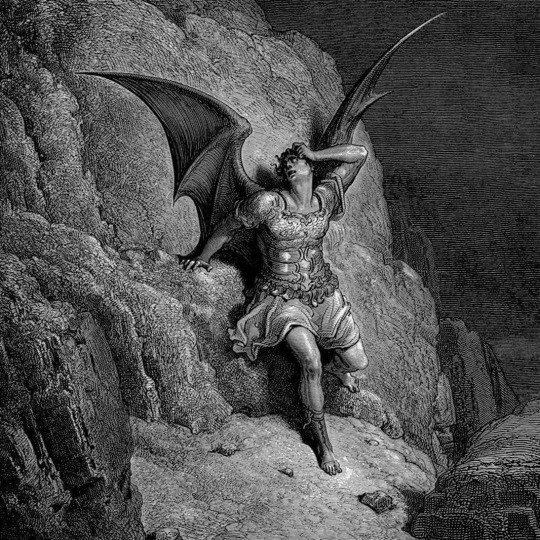

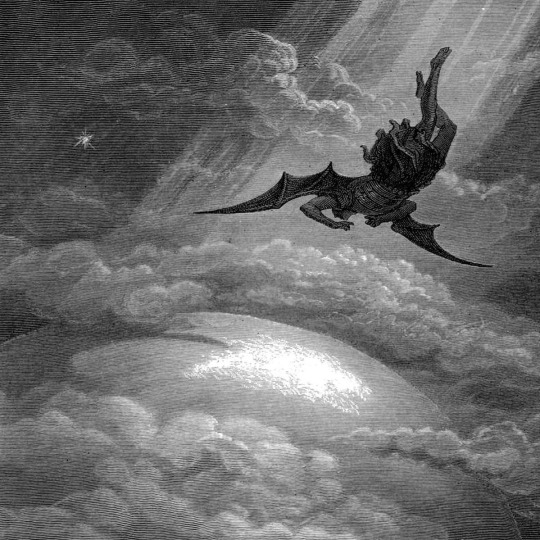
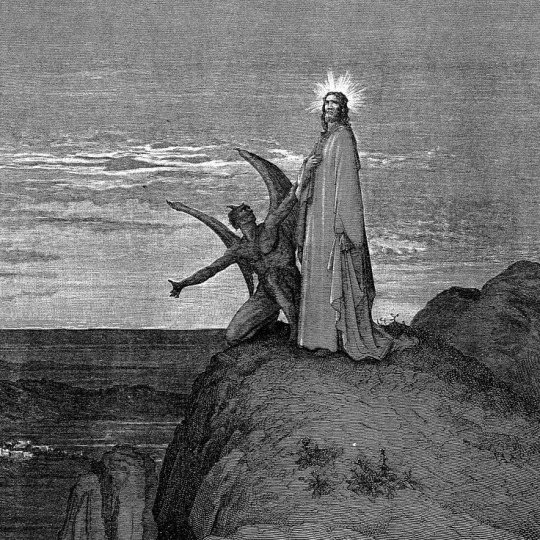

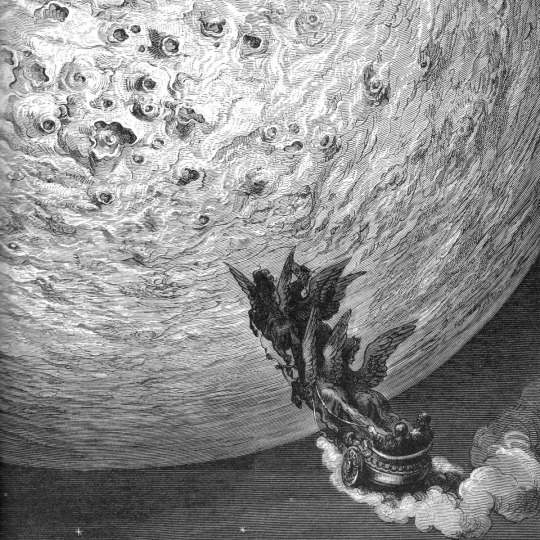

Artists: Gustave Doré (1832 - 1883)
#absurdism#french literature#academic writing#dark academia#academic aesthetic#academia aesthetic#albert camus#english major#academia#french#italian#dante#divine comedy#religious themes
2K notes
·
View notes
Text
My Top 10 Favorite Quotes From Sartre's Nausea
Favorite books are something truly remarkable. Just the idea that we can hold something in our hands and flip through the pages of prose and say, "This is me; this is a part of who I am," is so genuinely unique. I don't think many people get to feel that anymore. I remember feeling it in high school. My copy of Perks of Being a Wallflower is well-loved and has been since I cracked it open the first time.
The version of myself that I am today has read a lot since then. I've learned a lot, grown a lot, and seen a lot, and while Perks will always be a very special story to me, the most inluential thing I've read outside of a classroom in my college years has been Jean Paul Sartre's Nausea. Half fictional journal, half philosophical text, Nausea is Sartre's existential masterpiece.
Art is subjective. Instead of listing the 10 greatest quotes from Nausea, I will list my 10 favorite quotes. These are in no specific order.
"Something has happened to me:I can't doubt that anymore. It came as an illness does, not like an ordinary certainty, not like anything obvious. It installed itself cunningly, little by little; I felt a little strange, a little awkward, and that was all. Once it was established, it didn't move anymore, it lay low and I was able to persuade myself that there was nothing wrong with me, that it was a false alarm. And now it has started blossoming" (5).
A terrific opening paragraph to a fantastic book. Here we see the nausea being introduced to us before anything, a meaningful nod to the fact that the book is more about the idea of this nausea than it is about the actual characters.
"Three o'clock is always too late or too early for anything you want to do. A peculiar moment in the afternoon. Today, it is intolerable" (17).
I've always felt that the hours of two and three in the afternoon were the Novembers of the day, the Thursdays of the clock face.
"My memories are like coins in the devil's purse: when it was opened, nothing was found in it but dead leaves" (39)
This is such a firm quote in the context that the character refers to his inability to remember simple things. He claims it's a part of the nausea, and I've always adored the use of the metaphor.
"I have no need to speak in flowery language. I am writing to understand certain circumstances. I must beware of literature. I must let my pen run on without searching for words" (67)
The writer telling himself to beware of literature is a striking thing to read. There's a great deal here about writing to explain and writing to depict, and after giving it some thought, this is how I feel whenever I write for school or work. Discard the sensitive, stick to the necessary.
"They would like to make us believe that their past isn't wasted, that their memories have been condensed and gently transformed into wisdom. Convenient past! Pocket size past, little gilt-edged book full of fine maxims. 'Believe me, I'm talking from experience, I've learned everything I know from life.' Are we to understand life has undertaken to think for them?" (82)
It is possibly naive of me to think this, but I believe this when I hear old people try to combat me by saying they automatically know better than I do because they're older. If your experiences account for your knowledge, then all you have are memories. You can't graduate school based on your childhood memories, now can you?
"Wednesday: I must not be frightened" (84).
It's such a jarring passage, and it's humorous to me.
"There was nothing in it that wasn't present. The letters which I had just written on it were not dry yet and already they no longer belonged to me" (114).
The existential identity crisis that disguises itself as the nausea is so wonderfully described throughout this book. The realization that nothing you do really belongs to you, and everything you leave behind will be devoured by the rest of the world is a heavy one.
"Tuesday: Nothing. Existed" (123).
It's something I love to say every Tuesday evening. I quote this a lot, it's just so easy to remember and it's such a nice reference.
"It bursts, its little white guts come out of its belly; I have relieved it of its existence. I say dryly to the Autodidact: 'I have done it a favor'" (124).
Quotes like this give me the feeling of nausea that the narrator also feels. This sameness in experience is bleak, but Sartre does a beautiful job of making me feel this hollow illness.
"'I was just thinking,' I tell him, laughing, 'that here we are, all of us, eating and drinking to preserve our precious existence, and that there's nothing, nothing, absolutely no reason for existing'" (134).
This quote singlehandedly sums up the entire meaning of the text. This sarcastic, bitter, and blunt statement exposes us to the true horror that Sartre and his peers felt. Here is Nausea in its most purely concentrated form.
Works Cited
Sartre, Jean-Paul. Nausea (Penguin Modern Classics). Translated by Robert Baldick, Penguin, 2000.
#absurdism#french literature#academic aesthetic#academic writing#dark academia#academia#academia aesthetic#albert camus#english major#french#jean paul sartre#sartre#nausea#existentialism#absurdist philosophy#french philosophy#philosophy#literature
2 notes
·
View notes
Photo
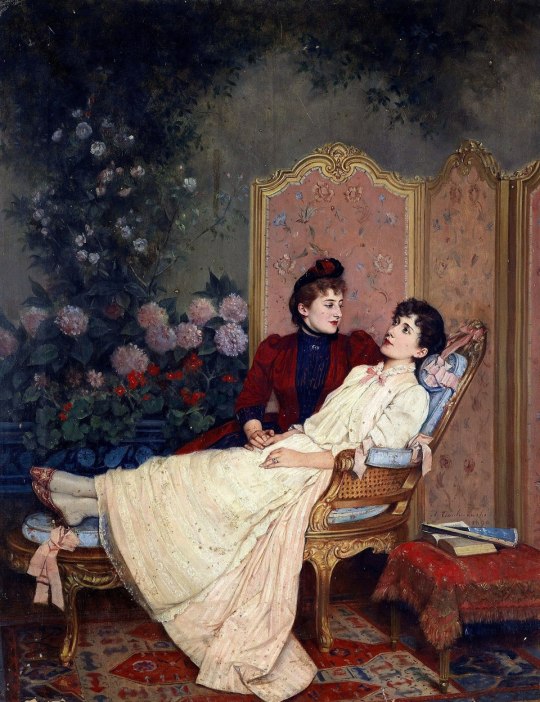
Auguste Toulmouche (French, 1829-1890)
Daydreams, 1890
#absurdism#french literature#academic aesthetic#academic writing#dark academia#academia#academia aesthetic#albert camus#english major#french#art#painting#oil painting
1K notes
·
View notes
Text
The Woman Who Made Sartre
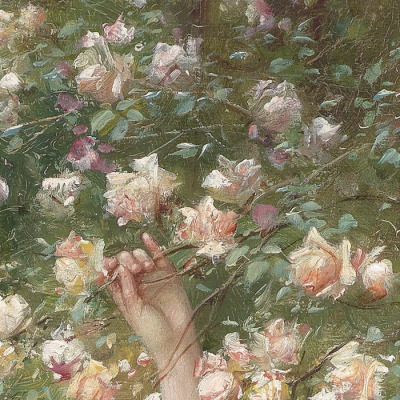
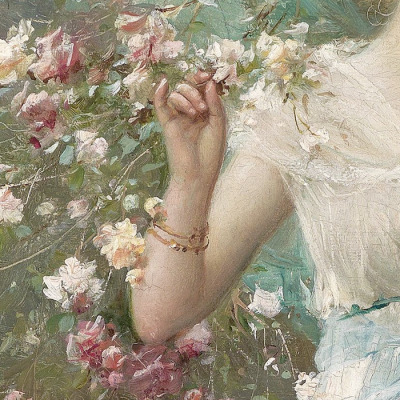
Left and right: Hans Zatzka, Blumenreigen, 1859-1945
A broad group of people consider Jean-Paul Sartre one of, if not the number one, greatest philosophers to come out of the twentieth century. His works on ethics, existentialism, and fictional literature have been praised and carried throughout the twenty-first century. I still consider Nausea my second favorite book, only inches away from that number one spot. But Sartre's work was heavily influenced and edited before it went to the publisher.
As seems to be often the case throughout history, behind this man's genius was a woman whose credit goes rather unnoticed. So, who was Simone de Beauvoir, this feminist writer who could neither love nor leave Sartre? And how is she significant in her own regard? Let's look at her best works, both fiction and philosophy.
L'Invitee
Despite having a strange relationship with Sartre, Beauvoir started another relationship with a female student named Olga (tameri.com). This odd triangle would later prove to be toxic, and as can be seen through the letter between Sartre and Beauvoir at the time, Beauvoir would eventually turn to feel trapped by the relationship. The negative feelings toward Olga turned into the novel, L'Invitee, or She Came to Stay.
She Came to Stay is about a couple inviting a young girl into their lives to stay with them, encouraging terrible consequences. Incredibly on the nose with its inspired source material, the troubled trio becomes an ouroboros of madness, each person in the relationship driving each other crazy and pushing them deeper into madness. The affair ends only in violence, and the murder of one of them by another member of the trio is the lid that closes upon the bleak and turbulent tale.

Image from Twitter user "fuckttrevor"
The text is packed full of philosophical reflections on relationships and the meaning of how we view relationships with existence, partners, and the infinite timeline we merely glimpse upon. Stanford University has a pretty good idea of the subject matter, stating that
The issues raised in this first novel, however, the ambiguity regarding the responsibilities and limits of freedom, the legitimacy of violence, the tension between our experience of ourselves as simultaneously solitary and interwined with others, the temptations of bad faith and the examination of the existentially faithful relationship to time will pervade Beauvoir's subsequent reflections (Standford University).
Through this display of tumultuous relationships and festering madness that only results in murder, we are shown the limits people can have, even if they try their best to remove them. This balance between humans and their doomed relationships, both with and without each other, would later set Beauvoir up for her most famous work.
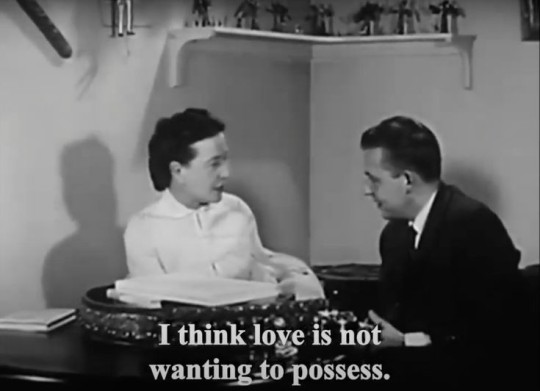
Simone de Beauvoir in a televised interview (1975)
The Second Sex
Taking personal writing, political beliefs, and philosophical poise into her pen, Beauvoir would write The Second Sex. This non-fiction work has remained one of the most significant examples of feminist literature.
The first argument that Beauvoir makes has been upheld for decades, and that is the idea that men create systems of inequality to keep women where they are in society. Sure, they may say that women can do what they want, and they may say that women are their equals, but they help uphold and police these societal and governmental systems of oppression against anyone who is not within the male gender. (tameri.com) From there, she goes into her second argument.
Going head-to-head with Plato, Beauvoir suggests that being different from men is okay. Where Plato said that women could be equal to men if they performed the same way as men, Beauvoir argues that the differences between men and women should not create a rift. These differences should be validated by each gender.
Differences should not lead to the absence of sameness.
Works Cited
Bergoffen, Debra. “Simone de Beauvoir (Stanford Encyclopedia of Philosophy/Winter 2014 Edition).” Stanford Encyclopedia of Philosophy, 17 August 2004, https://plato.stanford.edu/Archives/win2014/entries/beauvoir/#SecSexWomOth. Accessed 10 December 2023.
The Existential Primer. “Simone de Beauvoir.” Existential Primer, 2 March 2023, https://www.tameri.com/exist/people/beauvoir/. Accessed 10 December 2023.
Futher Reading
#absurdism#french literature#academic aesthetic#academic writing#dark academia#academia#academia aesthetic#albert camus#english major#french#simone de beauvoir#jean paul sartre#beauvoir#existentialism#feminism#the second sex#l'invitee#writeblogging
2 notes
·
View notes
Text
Passionate Prose From A Perverted Philosopher: Bataille’s Poetry
Most people are not familiar with the works or life of Georges Bataille. I don't blame them. I'm sure my professor is looking at this with fearful eyes, praying I'm not actually about to start a post on the Georges Bataille, the notorious anti-philosopher and writer whose works have made him rather infamous. Well, don't worry. I'm not about to make a whole post on surrealist literary fetish pornography. No, we're going to take a more muted approach and look at Bataille's key concepts and ideas through his poetry.
There are no graphic depictions of masturbating with a chicken egg here, folks. Just some twentieth-century poetry so dark it helped inspire the lyricism of the black metal genre movement (a movement that included the burning of churches and ended with the murder of some people).
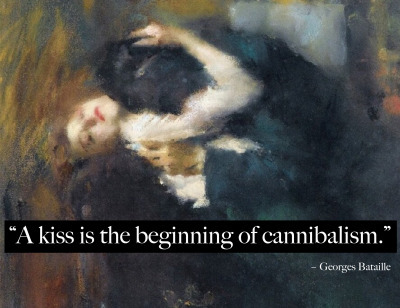
Ambrogio Antonio Alciati, The Kiss, 1917.
Key Concepts
Hopping from surrealism, to eroticism, to religion, and eventually starting an occult group, Bataille's writing is anitsystematic, and it's diffiicult to categorize into a few labels. Thankfully, there are prevalent themes that shine through the messy, dark chaos that he left behind. These themes are predominantly themes of myth, pain, and social transgression (Mambrol).
The easiest way to explore those themes is to sort through the poetry of Bataille. Bataille was a surrealist, and actually was an associate of Andre Breton until Breton and he got into an argument and Bataille distanced himself from the group and the movement.
Myth
Myth is the first predominant theme in the library of Bataille.
Despite being on-and-off Christian and occultist, Bataille's swings of loving and hating God, spirituality, and the cosmic experience of existence was something he found a lot of room for. Not only did this appear in his specultaive fiction and autobiographical philosophical works, but this also appeared with the confines of his poetry.
O dead God
O dead God
Me
I hounded you
with hatred unfathomable
I would die of hatred
as a cloud
is undone
(Bataille and Kendall, 11)
Per this untitled example, Bataille has no problems saying the kinds of things that got him in trouble in his time. His disdain for traditional myth and religious iconography is only rivaled by his own strange hypocrisy. Going in and out of different religions and spiritual seasons, Bataille would often write in favor of these myths.
"At the height of the heavens / the angels, I hear their voices, glorify me / I am, under the sun, an errant ant" (Bataille and Kendall, 13).
Here, Bataille was in a season of deep religious fervor. He felt so small to the passionate outpouring of the heavens, a glrious feeling that he would write many poems about. This love and hate relationship with mythology and relgious structures would pave the way for many of his stranger, more ethereal works.
Pain
To say Georges Bataille was emo would be to undersell his emotionally black works. The suffering and emotional torment he speaks of isn't that of a Pierce the Veil song, rather his kind of authentic pain belongs to something more in line with DSBM (depressive suicidal black metal). It doesn't come as a surprise, he practically invented the lyricism for the black metal genre as a whole.
Verses about suffering, stars, violence, galactic existentialism, nihilism, strange fetishistic imagery, Satan, and either an extreme reverance for religion, or the dismal rejection of it, this specific niche of harsh music couldn't exist without Bataille's own flavor of self hatred (Bereshith and Fas).
Take, for example, such extreme verses as
I scream at the sky that
it's not me who is screaming
in this lacerating thunderstorm
it's not me who is dying
it's the starry skies
the starry sky screams
the starry sky cries
I fall asleep and the world is forgotten
(Bataille and Kendall, 34)
As you can see, the edgelord himself, Bataille, outdoes a good amount of the goth and emo campiness. He settles for something a good bit more horrific, including depictions of murder and violent sexual content. But why? Why write poems about vehement antireligious and religious ideologies, self destructive tendiencies, gross sex, and violence? Because Bataille was a transgressive author.
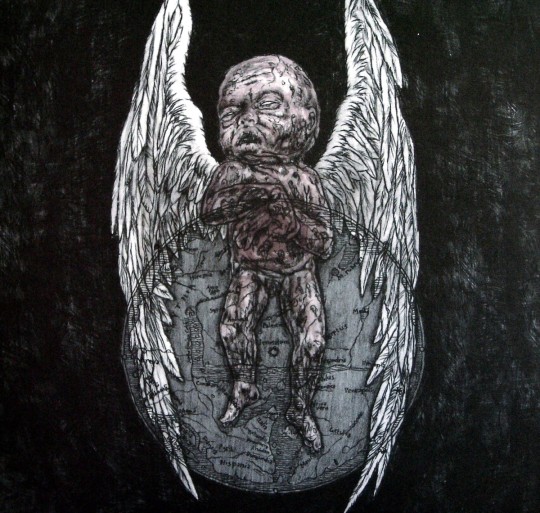

Left: Deathspell Omega, Si Monvmentvm Reqvires, Circvmspice, 2004. Right: Deathspell Omega, Deathspell Omega Logo, 1998
Social Transgression
Bataille was a transgressive philosopher and artist. Despite being an antisystematic writer whose interests were scattered, it is impossible to fight the fact that he was a figure of transgression.
Transgressive art is art that defies rules, laws, expectations, or norms. It is often shocking and causes quit ethe controversy. Other examples of transgressive artists would be Marilyn Manson, Jorg Buttgereit, Marquis de Sade, Rozz Williams, and John Waters.
I won't touch upon the topic of "is shock art true art" but I will say that Bataille and others like hm went on to make quit ethe names for themselves. Although these ideas and tpics may not be that taboo to the social norms of today, it disturbed many people to read something such as
Bird's laughter filthy with blood
crash of ice from teeth
filth screaming vomiting
head hung in horror
(Bataiile and Kendall, 129).
I mean, when a dude from a band called Deathspell Omega does an interview and lists you as a reference of inspiration, you've probably said some dark stuff that caught on with a very specific crowd of people.
And if you think tat's bad, look into his novel, The Story of the Eye. I dare you.
Works Cited
Bataille, Georges, and Stuart Kendall. The Poetry of Georges Bataille. Translated by Stuart Kendall, State University of New York Press, 2018.
Bereshith, and Fas. “Interview with Deathspell Omega from AJNA Offensive.” Deathspell Omega, https://ezxhaton.kccricket.net/interview.html. Accessed 8 December 2023.
Mambrol, Nasrullah. “Key Concepts of Georges Bataille – Literary Theory and Criticism.” Literary Theory and Criticism, 2 May 2017, https://literariness.org/2017/05/02/key-concepts-of-georges-bataille/. Accessed 8 December 2023.
Further Reading
#literature#absurdism#dark art#expressionism#transgression#french#french literature#english major#georges bataille#academia aesthetic#dark academia#academic aesthetic#academia#academic writing#the story of the eye#poetry#poems#writeblogging#blog#writeblr#transgressive art
10 notes
·
View notes
Text

"I leave Sisyphus at the foot of the mountain! One always finds one's burden again. But Sisyphus teaches the higher fidelity that negates the gods and raises rocks. He too concludes that all is well. This universe henceforth without a master seems to him neither sterile nor futile. Each atom of that stone, each mineral flake of that night-filled mountain, in itself forms a world. The struggle itself toward the heights is enough to fill a man's heart. One must imagine Sisyphus happy."
Albert Camus, The Myth of Sisyphus.
345 notes
·
View notes
Text
France's Reigning Philosophy Champion: Albert Camus


For a guy who died long ago, Albert Camus still keeps a name for himself in the modern zeitgeist. I can't search for literature or philosophy here or on Pinterest without getting flooded with memes about him and his writing. Other than photos of him smoking cigarettes, wearing a dark jacket, and looking like he listens to The Cure too much, the appearance of his characters and themes from his two most famous works - The Stranger and The Myth of Sisyphus - have been kept alive by edgy teens and literature majors alike. But why? Of all of the philosophers and writers from the twentieth century, why has Camus been so consistent in his popularity? Well, it all concerns his works' internal themes and shocking content.
L'Etranger
Camus' most popular fictional text works so well when brought into the modern day for a few reasons. Honestly, the biggest reason is the ease of comprehension and the length. The translations of The Stranger are simple in prose, and the story is short. Personally, the first time I read it, I listened to an audiobook of it at work. The whole thing was only five or so hours, a considerably short listen time compared to even other short works of fiction.
The Stranger is about a man who doesn't feel wrong about his mother dying of old age. He doesn't cry, he doesn't get sad, he just feels okay with his mother passing away peacefully. She lived in a retirement home anyway, so he feels at peace with this event. Later in the novel, an accident occurs where he kills a man. When put on trial, the judge and jury mention that he didn't feel wrong about his mother passing on. In fact, everyone seems to care more about the fact that he's unbothered by her death, and no one even seems to mention the accidental murder of a man. He is later left alone in a cell to consider his existence before he is executed.
If you hadn't noticed prior, the recurring theme of French texts is that they're pretty bleak. It doesn't really get any happier from here.
The Stranger presents ideas catching on with the modern world because the contemporary world needs these ideas to be delivered to them. Why does The Stranger hold such a firm grasp over the twenty-first century? What does it teach us?
"That we shouldn't be so pedantic; that we shouldn't summarily judge — from so high — those who appear to think so differently from us; that we mustn't fall into the trap of thinking others deserve nothing but contempt, rejection, or the electoral or social guillotine" (Laine).
In an era of polarizing politics, cancel culture, internet celebrities, and heightened backlash against people online, Camus's text reminds people of the absurdity of the world in which we live today. It seems strange we should remind humans of their humanity, but if history can show us anything, it's that people have a tendency to get cozy with xenophobic tendencies.


Le Mythe de Sisyphe
Opening a book with a discussion of suicide, the absurdity of life, and throwing slight shade at your ex-best friend all within the opening chapter is insane. Everyone who has ever gone through an English class at some point in their lives or educational journey should know to always have strong openings to entice their readers, but it is entirely wild to begin reading Camus's The Myth of Sisyphus and suddenly be hit with the aggressive opening line which simply says,
"There is but one truly serious philosophical problem and that is suicide" (3).
Intense, right? The idea that follows such a bold opener is that life is absurd. See, if life is meaningless, then why not just kill yourself? If you all feel disdain for your existence, why not end it? After all, if there is no true meaning to your work or your labor, if there is no afterlife or greater personal resolve to any of your experiences, then why even attempt to feel it? Here enters Sisyphus.
Sisyphus was cursed to roll a bolder up and down a mountain eternally. That sounds awful. Well, according to the absurdities that Camus writes about, it isn't all that bad. The main thing to consider is the idea that Sisyphus enjoys his work, or as Camus puts it,
"One must imagine Sisyphus as happy" (123).
One must accept the absurdity of their life and the circumstances they are placed in. If Sisyphus can find peace in his eternal task, we can surely get out of bed in the morning and do the same. It is up to us to make meaning out of the absurdity of our lives.
This idea is quite popular today.
As the digital age brings new trials and hurdles to navigate, it can become disheartening to go through every step of life knowing that most of us will just end up as pieces in the capitalist machine. But Camus, and his Sisyphus, call for us to avoid such negativity.
It's ideas of absurdity - and how to cope with that absurdity - that keep Camus at the forefront of philosophical writers in the contemporary age.


Works Cited
Camus, Albert. The Myth of Sisyphus. Knopf Doubleday Publishing Group, 2018.
Laine, Mathieu. “Camus Revisited, How The Stranger Speaks To Our Troubled Era.” Worldcrunch, 5 April 2018, https://worldcrunch.com/opinion-analysis/camus-revisited-how-the-stranger-speaks-to-our-troubled-era. Accessed 8 December 2023.
Further Reading
#absurdism#french#french literature#absurdist philosophy#philosophy#albert camus#camus#french philosophy#the stranger#the myth of sisyphus#sisyphus#academia#dark academia#academic writing#academic aesthetic#academia aesthetic#english major#french art
4 notes
·
View notes
Text
A Guide to the Father of Surrealism: Andre Breton

Philippe Jean (1931-1987) — “Elle était subjuguée par Le Monde” [oil on canvas, 1967]
Considering the topics in my last post, The Two Basic Pillars of French Literature, it'd be best to start this excursion with Andre Breton, the man widely considered to be the father of surrealism. The idea of surrealism is pretty straightforward, but it gets tricky the longer you think about it. Ironically, that's the point.
Surrealism is acquired when one pushes away the rational thoughts and everyday logic that goes into making traditional art. Surrealism is dreamlike, bizarre, and often challenging to understand. Sometimes, it's even difficult to look at. By accessing the subconscious, Breton and his peers could create art that had never been seen before (other than the similar dadaist movement, but that was based more on goofy arrangements of rational imagery).
Breton used his ideas on surrealism and put them into two pivotal works of literature that defined his career: The Manifesto of Surrealism and Nadja.


Left: Fernand Aubrey, MASKS, 1950. Right: Georges Spiro, "Composition Surréaliste" 1960
Le Manifeste de Surrealisme
The Manifesto of Surrealism (1924) is Breton's most famous and widely renowned work. In it, he goes on to explain what exactly surrealism is. Breton was one of many to publish a manifesto on the subject matter. Many of his peers and rivals tried to coin the term and define the movement for themselves, but in 1924, Breton's manifesto became the generally more beloved guide. It would travel the world and be used by artists, writers, filmmakers, poets, and visionaries everywhere. Breton's words would even be included in works he inspired, such as being stamped in braille in Leon Ferrari's famous "Union Libre" pictured below.

Leon Ferrari, "Union Libre", 2004
Breton's definition of the movement would shortly become famous.
"Pure psychic automatism, by which an attempt is made to express—either verbally, in writing or in any other manner— the true functioning of thought. The dictation of thought, in the absence of all control by reason, excluding any aesthetic or moral preoccupation" (Academy of American Poets).
Discard all logic, and throw away the mindfulness you pay to your work. Surrealism is the logic of dreams, the strangeness in the human subconscious. A twentieth-century American surrealist writer would later simplify the idea to four words: Exterminate all rational thought. I'll let you guess the author.
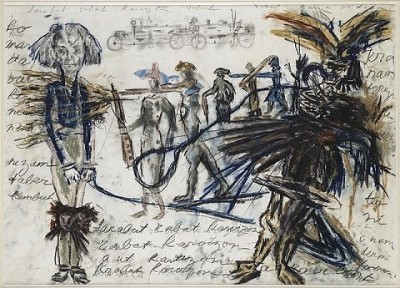
Antonin Artaud, La projection du véritable corps, 1948
Nadja
Breton would eventually take this philosophical art theory and apply it himself through literature. In 1928, he published Nadja, a strange novel about a girl. The protagonist rambles on about surrealism, gives a description of a ten-day love affair with a girl named Nadja, and realizes she's insane and that he cannot continue the relationship. Then he gives a detailed monologue lasting a quarter of the length of the novel on how her absence destroys and inspires him.

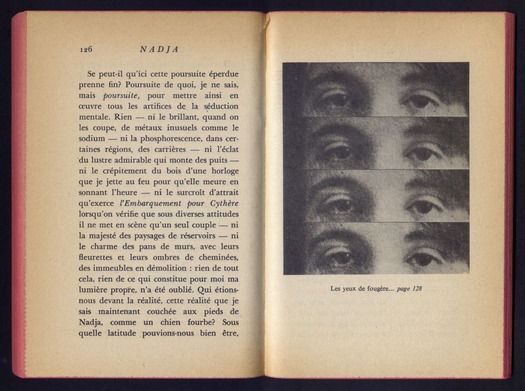
Left: Cover of the 1928 Gallimard edition of Nadja, collaged cover by Marcel Mariën. Right: 1964 Le Livre de poche edition of Nadja, interior.
Nadja is a bizarre text. It's non-linear, borders as a sequel to his 1924 manifesto, and the density of the strangeness makes it a difficult read for most people; that means it did what Breton intended.
Breton can take the reader through his surreality through this dreamy, irrational writing pace. Surreality was considered the world where surrealism took place, eventually helping make surrealism into an ideology, not just an idea. Nadja was the first surrealist fictional work to be published. With it, forty-four images were added to the book to help create another layer of dreamy imagery.
And with that, I will end this post the same way Breton ended Nadja.
"Beauty will be convulsive or will not be at all"(162).
Works Cited
Academy of American Poets. “About André Breton | Academy of American Poets.” Poets.org, https://poets.org/poet/andre-breton. Accessed 7 December 2023.
Breton, André. Nadja. Grove Press, 1988. Accessed 7 December 2023.
Further Reading
#surrealism#English major#french#french literature#andre breton#nadja#surrealist manifesto#existentialism#absurdism#writeblogging#dark academia#academia aesthetic#academic writing#academic aesthetic
3 notes
·
View notes
Text
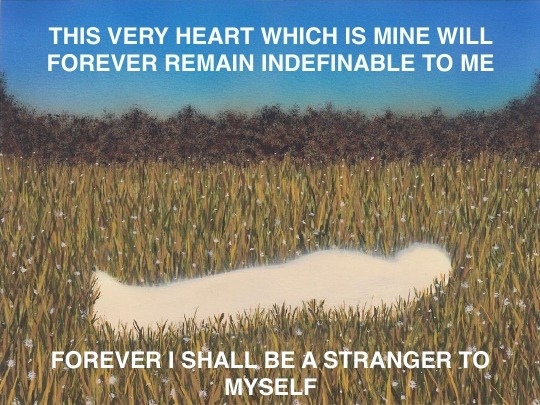
The Myth of Sisyphus, Camus / Untitled, Sung Hwa Kim l
2K notes
·
View notes
Text
The Two Basic Pillars of Modern French Literature
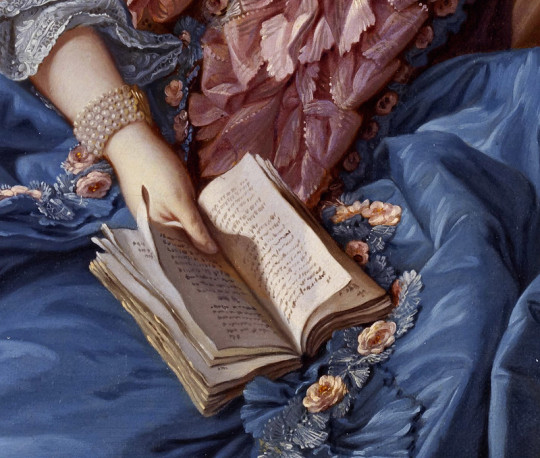
François Boucher, 1758: ‘Madame de Pompadour’
Exploring French literature almost feels like you're walking through no-mans-land while high. At the intersection of skinny white guys chain-smoking and coping with existence, the boulevards of blunt feminists and philosophers arguing angrily about ethics, and the dark alleys where people do drugs and do weird stuff, there lies the beautiful merit of loving these works. You'll have to adjust to it first, but that's why I'm here to guide you. Before I utilize this blog space to make it what I want to, I should give a general idea of what I'll be discussing here. Most of these works of strange literature belong to either the camp of surrealism or absurdism. Where better to start than at the beginning?
Surrealism
Surrealism is an art and literature movement initially coined by French author Andre Breton in his 1924 work, The Surrealist Manifesto. I'll talk more about him and his manifesto in a later post. Breton defined this movement as "psychic automatism in its pure state, by which one proposes to express - verbally, utilizing the written word, or in any other manner - the actual functioning of thought" (The Art Story Foundation).
What this entails is a process in which the artist must let go of all rationality and logical thinking in order to dig deep into their unconsciousness; there's a reason surrealist works have been described as "dreamlike". The whole idea is to create evocative, hallucinogenic literature that mimics dreams and cries out from the subconscious. Generally speaking, the weirder the better.
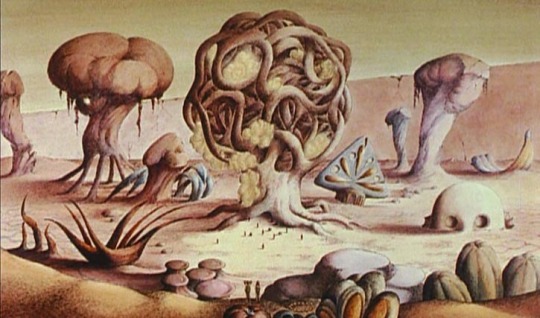
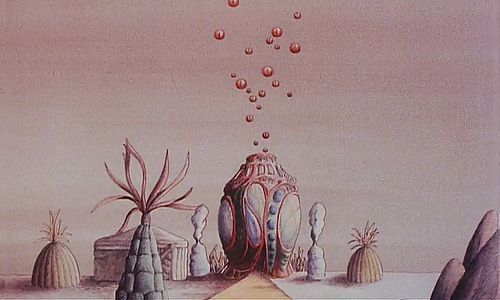
Landscapes from Fantastic Planet (1973)
Absurdism
France's oddest, most popular literary export is the absurdist movement.
Absurdism is "a philosophy based on the belief that the universe is irrational and meaningless and that the search for order brings the individual into conflict with the universe" (Merriam-Webster). Depressing stuff, I know, but that's not really what the French father of absurdism, Albert Camus, had in mind. The idea is that since nothing matters, you can make your own meaning. For some this philosophy is dark, and for others, it is a relief.
A great example of the polarizing effects of absurdist ideas, especially those of French authors, is by looking at the reviews of literary critics. Most of them need to fully understand that absurdism is about the absurd. The genre is weird just to be weird, and the only reason for this is because why not? To quote Professor John Sutherland, "Critics have produced countless theories to explain the significance of absurdism - and this diversity of interpretive meanings is the paradoxical result of a type of literature that takes the meaninglessness of life as its premise." These meanings and rational thoughts deprive absurdism of its liveliness and charm. In this way, absurdism and surrealism share a few traits.
It's a controversial mixed bag, absurdism, but it stands to be one of the longest-lasting genres and philosophical studies to come from France. Personally, I'm excited to introduce you all to it.

Works Cited
The Art Story Foundation. “Surrealism Movement Overview” The Art Story, https://www.theartstory.org/movement/surrealism/. Accessed 6 December 2023.
Merriam-Webster. “Absurdism Definition & Meaning.” Merriam-Webster, https://www.merriam-webster.com/dictionary/absurdism. Accessed 6 December 2023.
Sutherland, John. “The Absurdity of Existence: Franz Kafka and Albert Camus.” Yale University Press, 16 September 2015, https://yalebooks.yale.edu/2015/09/16/the-absurdity-of-existence-franz-kafka-and-albert-camus/. Accessed 6 December 2023.
Further Reading
#french art#french literature#absurdism#surrealism#philosophy#literature#academia#dark academia#academic aesthetic#academic writing#albert camus#Andre breton#Georges bataille
0 notes